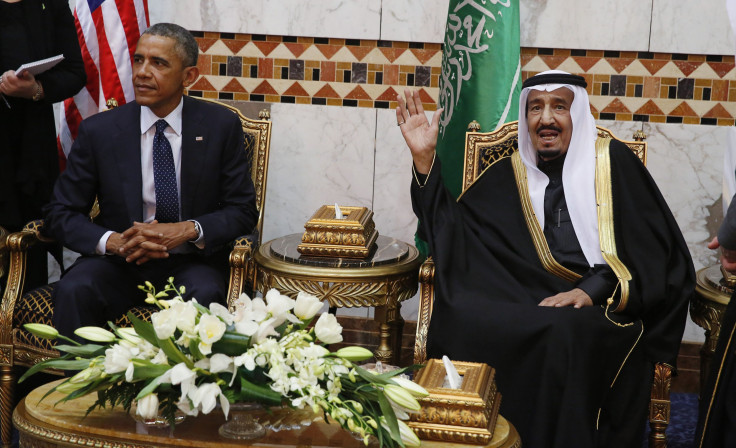
This week, an elite gaggle of U.S. politicians including Barack Obama, John Kerry, Condoleezza Rice, John McCain dropped their duties to pay respects to King Abdullah, Saudi Arabia’s recently deceased ruler. They also met the new heir, King Salman. On one hand, it was no surprise that the U.S. sent the bipartisan delegation to mourn one of it’s closest allies. Lowering oil costs, buying U.S. weapons, and generally pissing off the Russians, the Saudis have been staunch U.S. allies for decades.
Yet King Abdullah was, to put it bluntly, a dictator with absolute rule who oversaw a nation with the one of the worst human rights records in the world. In 2014 alone, Abdullah’s judicial system oversaw 80 beheadings, including capital punishments for such crimes as “sorcery,” apostasy, and drug smuggling.
Latinos in particular understand U.S. support of brutal dictators. It doesn’t matter if you’re roots are from Mexico, Venezuela, the D.R., El Salvador, Panamá, Nicaragua, Argentina, Brazil, Haití, Guatemala, Paraguay, Bolivia, Cuba or Chile--somewhere along the line the American government has supported a dictatorship that oppressed your ancestors.
To better understand the daunting and paradoxical relationship between Obama and Abdullah, we’ve put together a list of the top five relationships between U.S. presidents and their Latin American dictator counterparts.
Chilean Dictator Augusto Pinochet: Directed the murder, torture, and “disappearance of tens of thousands of people. Took power through a U.S.-supported coup d'etat on September 11th, 1973. May have assassinated poet Pablo Neruda.
.@JohnKerry joins President Obama in offering condolences to King Salman on the passing of the late King Abdullah. pic.twitter.com/yEQF9XjMB9
— Department of State (@StateDept) January 27, 2015U.S. President Ronald Reagan: "Reagan admired Pinochet and wanted to go to Chile to personally thank him for 'saving Chile' [....]. But his secretary of state said ‘absolutely not.’ Pinochet had too much blood on his hands," writes Peter Kornbluh (quoted in the Guardian).
Dominican Dictator Rafael Trujillo: Trujillo’s troops are most infamous for massacring innocent Haitians that lived along the vague Haiti/D.R. border. No one is sure how many he killed, but it numbers in the thousands. Internally, he repressed dissidents through torture and assassination. Not only did he allegedly rape young girls, but his son soon did the same, raping and killing so wantonly that Trujillo sent him to an asylum.
U.S. President Franklin Delano Roosevelt: Appreciative of Trujillo’s anti-communist and anti-fascist stance, his administration FDR’s administration helped cover up the massacre of Haitians with a P.R. campaign. “Sure he’s a son of a bitch, but he’s our son of a bitch,” FDR allegedly said of Trujillo.
Mexican Dictator Porfirio Diaz: Forced political rivals into concentration camps. Held power for over 30 years. Sold off national resources to foreign powers while doing little to nothing to alleviate poverty and illiteracy.
U.S. President Howard Taft: Like his predecessors, he spared Mexico the same interventionism dealt to the Philippines and Cuba, thanks to Diaz’s willingness to cater for American companies. Taft and Diaz came together in 1909 for the historic first meeting between between presidents of the U.S. and Mexico.
Like King Abdullah, most of these dictators were lauded in their day as “modernizers” and collaborators against common enemies. In Latin America, the enemy is communism. In Saudi Arabia, it’s Iran, and, ostensibly, the Islamic State. Then again, “When it comes to beheadings, ISIS has nothing over Saudi Arabia.” Not that beheadings are are the most important metric for running a country. Let's not forget quality of life, equal rights, and other factors.
In order to make it to Ridya, Obama cut short his trip to India, where he had just finished a speech about women’s rights.
"Every woman,” Obama, in a speech to the Indian should be able to go about her day — to walk the street, or ride the bus — and be safe and be treated with the respect and dignity"
He then flew to Saudi Arabia, where women need permission for a “male guardian” in order to travel, work, go to school or get medical treatment.
“Sometimes we have to balance our need to speak to them about human rights issues with immediate concerns that we have in terms of countering terrorism or dealing with regional stability,” President Barack Obama said ahead of his visit to the kingdom, in an interview with CNN.
© 2025 Latin Times. All rights reserved. Do not reproduce without permission.



